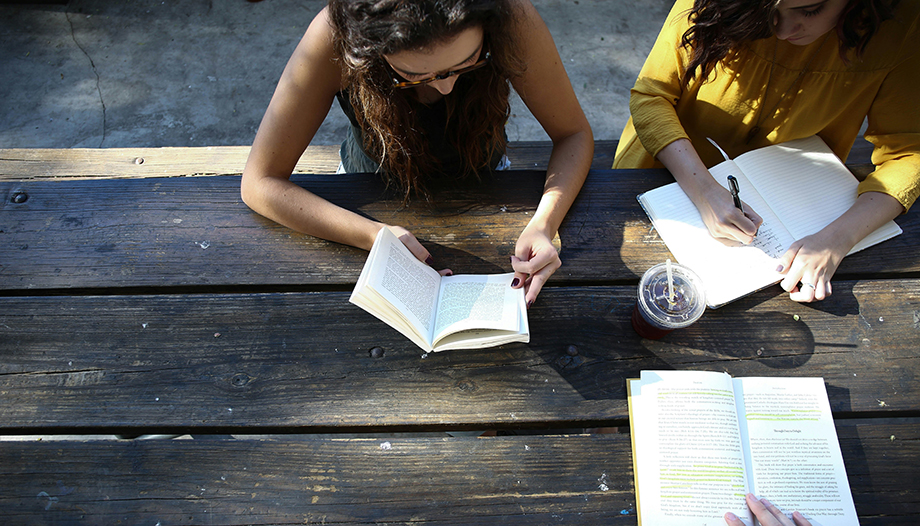Obtain credits by renewing the patient directory of a palliative hospital, study the legal channels for obtaining aid for mothers in vulnerable situations or devise and implement programs to help students who go to aid foundations.
All these ideas are part of the Service Learning methodology, an initiative that develops the Villanueva University and through which students put into practice their knowledge in different areas while collaborating with social dynamization projects, helping people with disabilities or from vulnerable environments and NGODs.
In this way, in addition to completing their academic training, students are part of social change, and learn first-hand about service applications for their professional work.
It is not a matter of lucubrations or a theoretical application but, as Guiomar Nocito, director of the Impronta Program, where Service Learning is integrated, points out, "the projects carried out with the Service Learning methodology are real projects, in which they have to put knowledge and skills into practice to solve a problem or meet a need of people who need it at the present moment. This is a challenge for the student, who at the same time that he learns, contributes with his work. There is a greater motivation for learning, an increase in civic awareness, and more meaningful learning. Service Learning transforms students, helps them to prioritize their values and to see that their learning is useful, that it serves a purpose".
A plus of interest for students
A statement corroborated by Paloma Martínez. This young law student collaborated, through this program, with the ONGD Harambee and, as she explains to Omnes, "I have had the opportunity to learn and hone key skills, such as international project management, fundraising and collaboration with various entities. The methodology has allowed me to increase my awareness of current social issues, understand the importance of committing to equality and social justice. It has also taught me the value of teamwork and the need for efficient and transparent management in cooperation projects".
Jorge, who was part of two projects, one for Harambee on the regulation and obtaining of funds for NGOs, and the second with Redmadre on aid to pregnant women and new mothers, expresses himself in a similar way. This young man emphasizes that "from the first one I would highlight all the research at international level in the different countries and their regulation of laws and aid, and from the second one, it was interesting to have to do the research, but I would highlight that my work was the first published study on women, abortion and money in the community of Madrid, asking more than 1000 women anonymously if, if they had had aid, they would have continued with their pregnancy, as well as the number of pregnant women in the Community (there was no data on either of these two statistics)".
Various projects
There are many and varied projects that form part of this learning model at Villanueva University: from the Atresmedia Foundation and others such as Prodis, Vianorte-Laguna o What Really Mattersto NGOs such as Harambee. To select the projects, the Service Learning Office contacts the entities, "to get to know them and determine how we can collaborate," explains Nocito.
In addition, "a study is made of the teaching guides, and we talk to teachers who may be interested in integrating these projects into their subjects. The projects must contribute to a community and fit perfectly with the objectives and development of the subject's competencies. After this, there is a meeting between the entity and the teacher, in which action plans are generated and the project is outlined".
The university proposes the projects to the students and then follows up. Paloma emphasizes that when she was approached to work with Harambee, she found it a "unique opportunity to grow both professionally and personally".
A learning model that students highly recommend. In Paloma's words: "They offer a unique opportunity to contribute to important social causes, which is very rewarding both personally and professionally. These projects allow us to apply academic knowledge in a practical environment, developing essential skills such as project management, information seeking and collaboration. In addition, the experience fosters personal growth by increasing awareness of global issues and cultivating a sense of social responsibility, which can inspire a lasting commitment to social justice and equality." In Jorge's words, "I felt like I was doing real work, helping people directly, and not just writing to get a grade, so my effort was much greater because I was not doing it for me, but for other people's real problems".
Guiomar Nocito sums up this methodology clearly: "This initiative is directly linked to our way of training the professionals of the future, who are aware of the impact that their work can have on the environment, apart from their own professional development. There is nothing as stimulating as learning by working on the real needs of the environment with the aim of improving it, which is why our university project integrates service to society into the teaching activity".







